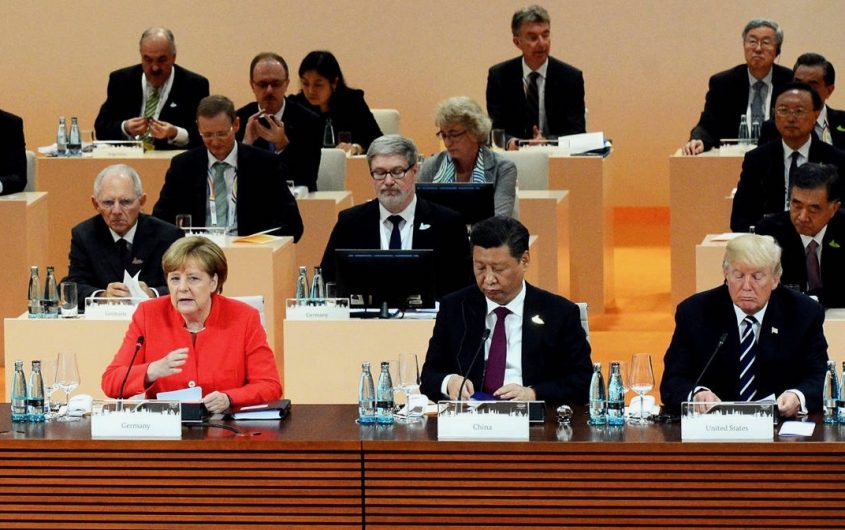
Casa Rosada via Wikimedia Commons
Germany and the United States: The Strategic Triangle in the Transatlantic Relationship
On May 4, 2018, a group of high-profile American and German government officials, think tank experts, and industry leaders came together at AGI to discuss transatlantic interests and strategies toward China. We welcomed Ina Lepel, Director of Asian and Pacific Affairs at the German Foreign Ministry, and Susan Thorton, Assistant Secretary of State for East Asian and Pacific Affairs at the U.S. Department of State, for a keynote exchange that laid out German and U.S. perspectives on China’s economic and geopolitical challenges and mutually reaffirmed the need and the will for bilateral cooperation on issues of common interest.
Responding to China’s economic and geopolitical rise is now a top priority in Washington and Berlin. Both sides want to continue to benefit from their respective economic relationships with China, while at the same time push Beijing to correct its protectionist policies and honor its pledge on accession to the WTO to abide by its rules and standards for international trade and investment.
Furthermore, the Chinese president Xi Jinping’s declaration to return China to its rightful place in the world has stirred up concerns about an erosion of existing international institutions, disruption to the rule-based global order, and a challenge to the West’s liberal, democratic values. China’s $1 trillion pledge for its One-Belt-One-Road initiative is the biggest geoeconomic and strategic challenge to the West since the end of the Cold War, providing not only an alternative platform of economic engagement to participating countries, but also a seemingly viable non-Western model of governance. Most notable is the growing challenge China represents in the cyber space, allegedly attacking government and commercial entities on both side of the Atlantic and simultaneously promoting its idea of cyber sovereignty.
Berlin and Washington’s clear common interest on the aforementioned issues was the focus of this transatlantic workshop. Participants in the workshop placed special emphasis on addressing Beijing’s trade and investment policies that aim to accelerate China’s race to dominate the next phase of industrialization and expand its global economic footprint at the expense of American and European interests.
Despite the Trump administration’s harsh criticism directed at Germany, both sides have made independent yet parallel moves to address these concerns vis-à-vis China. Bipartisan groups in the U.S. Congress recently introduced legislation that would significantly broaden the jurisdiction of the Committee on Foreign Investment in the U.S. (CFIUS). Last year, the German government amended the Foreign Trade and Payments Regulation to strengthen German review of foreign takeovers and successfully petitioned the European Commission to propose a European Union-wide foreign investment screening framework. In both cases, experts and government officials emphasized the need to protect strategic national interests and come up with new industrial policies to respond to China in the face of heightened global competition.
American and German participants agree that although unilateral measures, such as recent waves of U.S. tariffs, may have some success in their aim to push the Chinese government to comply with international free trade rules and reciprocate domestic market access to foreign companies in still-restricted industries, they are not good substitutes for a coordinated, transatlantic response. Participating German officials and experts expressed concerns that aggressive unilateral U.S. actions on trade may result in “friendly fire” and further hinder potential transatlantic cooperation. Berlin’s strong preference to deal with trade and investment disputes within the established international framework is now confronted by the fear that recent U.S. measures could seriously undermine these institutions and set off a global trade war. Their American colleagues pointed out that these unorthodox policies stem from the realization by many U.S. practitioners that available international institutions, such as the WTO, are ill-equipped to sanction China’s efforts to weaken or circumvent existing rules. In their view, recent U.S. tariffs are intended to act as an instrument of pressure to nudge China to the negotiation table.
The participants reached a consensus that although the state of the transatlantic relationship may not be ideal for broad cooperation, short-term bilateral consultations between government officials, policymakers, and experts are good exercises to bridge understandings of transatlantic strategies and could very well succeed in pushing Beijing to implement some long overdue reforms. In the long term, efforts from both sides to restart negotiations for a transatlantic free trade regime will be crucial to avoid an antagonization of interests between partners and to safeguard the principles and instruments of global free trade.








